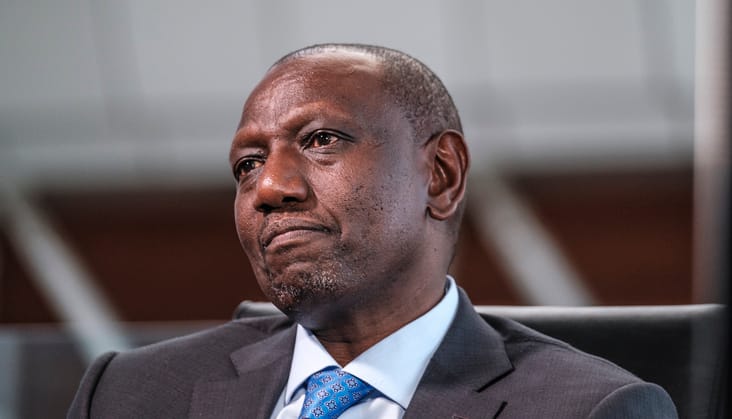Kenya’s President William Ruto sparked protests recently after donating some $150,000 to a Nairobi church just months after saying such hand-outs fuelled corruption.
Ruto’s pledge of 20 million shillings to the Jesus Winner Ministry Church led to protesters gathering there a week later, demanding the return of what they called “stolen tax money”, only to be teargassed by police.
Church donations and fundraisers are a longstanding tradition in Kenya, and politicians often use pulpits to reach the masses in the predominantly Christian country.
It can become political theatre: last year, MP Oscar Sudi, a Ruto ally, drew cheers from the congregation when he delivered a sack containing three million shillings (around $20,000) to a church in Uasin Gishu county.
But the practice has become increasingly divisive since mass protests broke out last June against tax hikes, corruption and police brutality.
In the aftermath, Ruto banned government officials from participating in fundraising drives for churches.
“No state officer or public servant shall participate in public contributions or any harambees (fundraisers) going forward,” he said in June.
“It is occasioning and it is breeding, if I may say, corruption,” Ruto added.
But he appears to have forgotten his vow.
While police were teargassing youth outside the Jesus Winner Ministry Church, Ruto was at another church in the town of Eldoret, offering another 20 million shillings (around $150,000) and vowing to raise a further 100 million for Jesus Winner.
The president was defiant, dismissing critics of donations as “people who don’t believe in God”.
The government says the money comes from Ruto’s personal funds but many are sceptical.
“Where is this money coming from? Bring us the receipts,” said Mwabili Mwagodi, who has helped organise the “Occupy Church” movement which aims to “disconnect the church from politics”.
The movement gained momentum last year after the church stayed silent during protests.
Preachers were ultimately forced to break that silence after activists organised flash mobs during services in Nairobi.
The Catholic Church of Kenya rejected a donation from Ruto after Mwagodi shared preachers’ contact details online and organised a barrage of complaints.
“I am fighting to liberate the Church from political corruption in Kenya,” Mwagodi posted on X.
Money laundering
A group of clergy has defended Ruto’s donation, calling it a “Godly idea”.
Catherine Njoroge, a worshipper at Jesus Winner told AFP: “He is filthy rich and can afford it.”
The church leaders refused multiple requests to speak with AFP, and the premises were guarded by seven armed police officers on a visit this week.
Critics accuse the government of illegally diverting public funds to churches to win voters and fear the donations could be used for money laundering.
“Some churches use their huge congregations and platforms for purposes of giving politicians political capital,” said Nairobi-based lawyer Javas Bigambo.
“It has been encouraging corruption,” he told AFP.
The president himself used to agree, and last year introduced the Public Fundraising Appeals Bill — still pending — to enhance transparency, though it exempted funds raised by religious bodies.
His office insists the ban on fundraisers by politicians is still in effect, even though several Ruto allies have since publicly participated in them.
Spokesman Emmanuel Talam said Ruto’s recent donation was a “personal contribution” but did not explain how this was different from fundraising.
Selling voters
In election years, Kenyan politicians flock to churches and give political speeches from the pulpit.
Some Christian politicians will even start praying in mosques on the campaign trail.
Reverend Timothy Njoya, a renowned Nairobi preacher, condemns the practice.
Njoya campaigned for political and social justice during the authoritarian rule of Kenya’s second president, Daniel arap Moi (1978-2002), and bears the scars from beatings he received at protests.
He told AFP that donations by politicians have turned churches into “graveyards of spiritualism” and that preachers who accept the cash “are selling their members for votes”.
Now retired, Njoya did not stand for such behaviour in his time.
“Politicians came to my church but they did not have the platform. I was the one preaching, not them. It was not their platform, it was God’s platform,” he said.
The National Council of Churches of Kenya recently barred politicians from addressing congregations or announcing monetary contributions from the pulpit.
But a defiant Ruto has insisted he will continue to “build churches”.
WARNING: If You Are Not 18+, Don’t Click The Link Below 👇🫣
https://disloyalmoviesfavor.com/kx6iepv2qm?key=6c14bd1d68e1eba721851f19778f5efe
https://poawooptugroo.com/4/8902554
Please don’t forget to “Allow the notification” so you will be the first to get our gist when we publish it.
Drop your comment in the section below, and don’t forget to share the post.
Never Miss A Single News Or Gists, Kindly Join Us On WhatsApp Channel:
https://whatsapp.com/channel/0029Vad8g81Eawdsio6INn3B
Telegram Channel:
https://t.me/gistsmateNG





